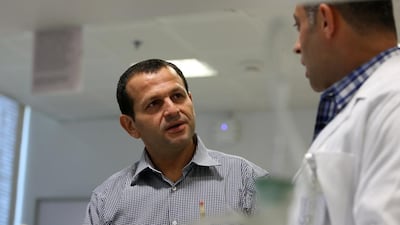AL AIN // Scientists have shown that a shrub native to the Middle East contains substances that kill cells in a type of breast cancer that can be difficult to treat.
Dr Rabah Iratni and his team at UAE University in Al Ain found that rhus coriaria extracts can stop tumour growth and the spread of cells of triple-negative breast cancer.
A shrub and small tree that grows in Lebanon as well as southern Europe, Rhus coriaria is the latest of many plants found to contain substances of medicinal value.
“This plant is amazing. I call it the goldmine,” said Dr Iratni, an associate professor of biology. “Quite frankly, the first time when we carried out the experiments in vitro, it was surprising.”
The study found that, among other things, the plant extract made it harder for the cancer cells to attach themselves to certain other types of cell, something that is significant because the adhesion is needed for the development of new tumours.
In vivo studies using chick embryos found that the plant’s substance also prevented the growth of tumours and the spread of cancer cells. The findings have been published in Scientific Reports, which is produced by the publisher of the prestigious journal Nature.
Triple-negative breast cancer is characterised by the cancer cells’ lacking receptors for a protein, HER2, and the hormones progesterone and oestrogen.
It is a more common form in younger women and the absence of the receptors can make it harder to battle because they are the targets of treatment with many other types of cancer.
Dr Iratni, a French-Algerian, began working on Rhus coriaria, also known as sumac, in 2014 after reading a paper that indicated the plant was rich in antioxidants and polyphenols, which are substances of medicinal value.
Traditionally, the plant has been used to treat medical conditions including dysentery, sore throats and liver disease, and previous studies have shown it has antifungal and antibacterial properties, among many other benefits.
Last year, Dr Iratni and his colleagues published a separate study on the plant in Scientific Reports, which showed that extracts could help cell death and prevent triple-negative breast cancer cells from multiplying.
The plant extracts fight cancer cells by disrupting several biochemical pathways.
Dr Iratni says his published findings are “just the visible part of the iceberg”.
His group has also found that its extracts cause the death of colon cancer cells, with full details of this work set to be published soon.
The researchers are also trying to understand which substances in the plant cause the anti-cancer effects.
The ultimate hope is that new drug treatments for cancer patients will emerge, although these would be at least several years away. “If a big company starts working on that, it can go very fast,” said Dr Iratni, adding that identifying the plant’s key bioactive molecules would speed up drug development.
“Big companies – in five years they can get a drug to the market.”
Dr Emma Smith, science information manager for the world’s largest cancer charity, Cancer Research UK, said the study represented “an interesting finding” but cautioned that “it’s only been tested on cancer cells grown in a lab”.
“At this stage we don’t know whether the plant extract could be made into a drug that’s safe or effective for patients,” Dr Smith said.
Many “secondary metabolites” found in plants − substances not involved in essential functions like growth and reproduction − have also been shown to have medicinal value.
Dr Iratni’s group has identified the medicinal value of other plants, including the herb marjoram, which they highlighted in 2013 as being useful in helping to kill triple-negative breast cancer cells.
A study by Dr Iratni and his colleagues in 2014 showed that the antibiotic salinomycin could kill lung cancer cells.
newsdesk@thenational.ae


